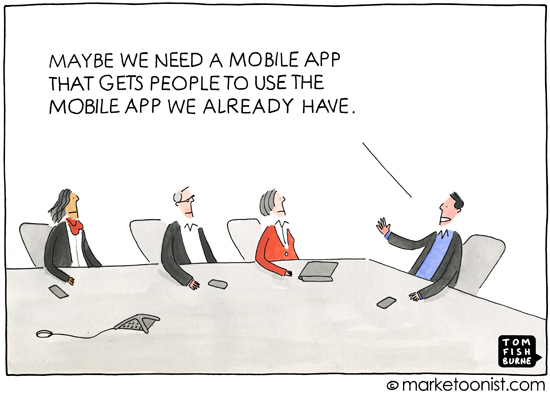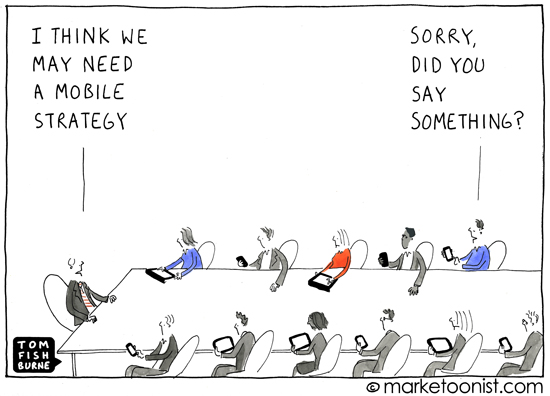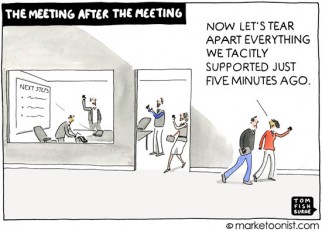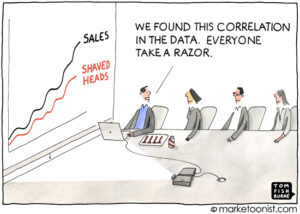Marketers increasingly see mobile as an integral part of the marketing mix and have invested significantly in mobile apps. 92 of the world’s top 100 brands have at least one app on Apple’s app store.
Yet most apps are completely lost in the clutter. There are over a million active apps for both iPhone and Android and 90% of people who downloaded an app are gone within 6 months. There currently isn’t a single CPG app on the Apple Store’s Top 200 list.
Many branded apps completely miss the importance of utility. As Adweek writes, CPG apps typically (and unimaginatively) focus on delivering coupons, not on the utility that a brand can bring consumers through their mobile devices.
The classic brand app case study is Nike+ Fuelband. I also like Charmin’s 5-year old SitOrSquat, a public restroom finder. It lets people search and rate public restrooms, which links nicely to Charmin’s brand positioning far more usefully than coupons.
I’ve been consulting with a mobile-only challenger brand called HotelTonight that has taught me a lot about the potential of connecting with consumers through mobile. HotelTonight is a travel app that lets you book last last minute hotel rooms. As a mobile-only business, they don’t have the legacy issues of hotel reservations, so their experience is designed entirely for what makes sense for mobile. Rather than the 40-50 taps and 100-110 seconds that Priceline and Hotels.com take to book a room with mobile, HotelTonight takes only 4 taps and 8 seconds. They’ve successfully challenged Goliath by taking a fresh eyes approach to mobile.
I think there’s value for any brand to look at their mobile strategy with fresh eyes. I’d love to hear your favorite case studies of bringing a brand to life for mobile.
(Marketoonist Monday: I’m giving away a signed print of this week’s cartoon. Just share an insightful comment to this week’s post by 5:00 PST on Monday. Thanks!)
Here’s a related cartoon from 2011.




Jonathan says
We have a saying in our organisation ‘useful not interesting’. So many people want to do ‘interesting research’ rather than useful research – in which we can actually use the results. I feel the same about apps. Is there any use to them? The public toilet one (SitOrSquat) brings a number of different elements together – you’re out and about (mobile), need something relatively objective recommended by real people (not the company selling you their branded goods) and is interactive too (you can contribute your own opinions). The only apps I use are ones which actually provide a useful quick service: train timetables, maps, news, document sharing etc. I bet that’s not an unusual wish.
Martin says
It’s the legacy strategy that applies to many mobile apps, where mobile app is just another way of ad/coupon delivery. I’m very much thinking about mobile as an additional channel to existing marketing channels – as opposed to mobile being a prolongation of email or print. Mobile as a channel has its own type of engagement, thus requiring mobile only value for the customer/user.
Simon says
It seems like it’s another case of people thinking what the technology can do for the brand, rather than what the brand can do for the consumer.
Donald Douglas says
My bin ( garbage) company send me an SMS with a reminder every Friday telling me to put the bins out. Their app pings me every month to tell me how good or bad my re-cycling was and how i compare to everybody else. Simple customer service done well and very mobile. ( if that was all done through email and a website it wouldn’t work.
Simon de Haast says
Context is king, not content, in mobile.
Marketers (and their agencies) have become so channel-myopic that all media becomes something to shove messaging aka content down; they lose sight of the the context of consumption or usage needs.
Instead of trying to use digital (which mobile is a huge chunk of that) solely as a channel tool, rethink how could it be used as a remote control for the customer relationship, adding convenience, speed or efficiency to the brand experience?
And this need not take the shape of an app – web-based apps are quicker to build and scale for the majority of use scenarios.
PS this is an interesting take on apps: http://www.mondaynote.com/2014/04/06/the-browser-is-the-os-19-years-later/
Luis says
Things to do in life (nowadays): plant a tree, have a child, write a book and have an app…
Ori Pomerantz says
Once again, this boils down to Capitalistic Humility, the virtue of making what people want to buy (or install and use), rather than what you want to sell. As customers, we don’t care about expanding your brand image. We care about something useful to us.
Concetta says
Tom, I don’t think it matters that a company has their own app. I think it matters more than they use mobile context in a smart manner.
A bunch of my friends watch the Bachelor/Bachelorette. In the Bachelorette last year, after the Clorox commercials, you could use the app Viggle to vote for the most “bleachable moments” in the show. It was funny, entertaining, and it tied Clorox to the positive experience that my female friends have with watching the Bachelorette.
I also think that it doesn’t necessarily matter if you’re in the top 200 list if you’re on the top of the charts in the right lists. For example, Kraft’s iFood Assistant is something I use every week to help plan meals and buy groceries. I know its been on the top 10 lifestyle apps before. I use the Chipotle app every week as well, and even though that’s probably not ever going to crack the top 10, its extremely useful to me and I appreciate their effort to make ordering quicker and easier. When I’m travelling, coupling Charmin’s app to find public restrooms with Thermos’ OasisPlaces app to find public water fountains is a great experience.
One thing that I also think brands need to consider when they do an app is if they can make it work on both the iTunes and the Android platforms. Nothing infuriates me more than when I can’t download something to my work phone (iPhone) or my home phone (Android) so that I can use my apps all the time.
Dave says
Several years ago now … has it been that long! Our organization strategically decided that we would invest in our mobile web site rather than an APP. We asked the question, what can an app do that a mobile site can not? In our business ( destination management) there answer was insignificant. We haven’t looked back. I think its funny when I go to a company’s mobile site and the first thing I see is a prompt to download their app. LOL. Does activity on an App somehow make me a longer and more qualified customer? Tom, you should do a cartoon on that because I find it really funny when the first thing a mobi site tells me is to download their app.
Marwann says
Hi Dave,
Activity on app should make you a consumer, just in the fact the repeated interactions with the brand, coupled with relevance and utility, makes your consideration higher, which therefore makes your brand attitude more likely to be activated when exposed to the brand.
I had written about it for my master thesis, if you want to read a 20-page sum up, here it is : http://www.slideshare.net/marwann/conceptual-model-for-brand-utility-on-smartphones/
Cheers,
Marwann